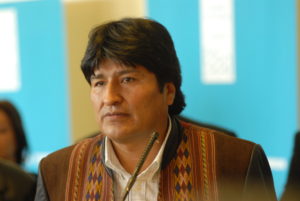Columbus, Marx and Zinn Go to Bolivia
What is ironically fictional in "Even the Rain's" story is the intrusion on a volatile situation of a film crew intent on portraying Christopher Columbus’ not entirely benign arrival in the New World. What is ironically fictional in "Even the Rain's" story is the intrusion on a volatile situation of a film crew intent on portraying Columbus’ not entirely benign arrival in the New World.
Eleven years ago, the Bolivian government attempted to privatize the nation’s water supply, posing a dire threat to its huge, impoverished native population, setting off a riotous and bloody confrontation between the authorities and its proud, yet still quite primitive, subjects. This much of “Even the Rain” is quite true, and portrayed with an authenticity that must have been very difficult to achieve in what is obviously a modestly budgeted film. What is ironically fictional in the story is the intrusion on this volatile situation of a film crew intent on portraying Christopher Columbus’ not entirely benign arrival in the New World.
It is a passion project for Sebastian (Gael Garcia Bernal), its impeccably liberal-minded writer-director, an idea he has nursed for seven years. Moody and occasionally dithering, he sees the violence gathering around his movie as a momentary madness, while the picture may well achieve immortality. These visionary vaporings are of small consequence to Costa (Luis Tosar), his line producer and production manager, who just wants to get the unit in and out of town on time, on budget and unharmed. Or so he thinks.
Their main problem is a beautifully ugly man they call Daniel (Juan Carlos Aduviri). He is hired to play the tribal chief opposing Columbus, though in real life he is, inconveniently, the charismatic leader of the forces opposing the water grab. This poses a practical problem to the moviemakers: He must finish his role in the movie before he is arrested or perhaps killed for his revolutionary activities.
It could be argued that the parallels between the historical events the movie is portraying and the gathering chaos of current events, as developed in the script by Paul Laverty (the longtime screenwriter for the leftist British director Ken Loach), is a little too tidy. But the director, Iciar Bollain, transcends ideological neatness; she is particularly good in her passionate handling of crowds (this is a movie in which no one just stands around waiting for someone to yell “Action”), and she is blessed with a very good cast.
Particularly Tosar’s Costa. He is a large, bald man, expertly conveying the typical production manager’s shrewd eye for detail. He is shown to be, at least at the outset, the kind of guy who knows just where to drop a useful bribe, smooth ruffled feelings, keep the moviemakers moving efficiently toward their shared goal. This is not easy, given the tendency of his native cast to confuse fiction with reality. But nothing really daunts him. And, in the course of his activities, he finds himself bonding with Daniel, which makes surprising emotional sense. The revolutionist, for all his far-darting activism, is devoted to his wife and daughter. The movie guy has a buried, compassionate side to his gruff loner’s nature. In effect, both men will have to acknowledge the mostly hidden humanity that underlies their more visible passions.
This happens when Costa is faced with a hard choice. As the revolution claims the streets of the small Bolivian city of Cochabamba, the actual site of the water war’s bloodiest confrontation, he is supposed to lead his cast and crew out of harm’s way, one jump ahead of the fighting. At the same moment Daniel’s wife pleads with Costa to take her to her daughter, grievously wounded and near death in a makeshift clinic. Only he, as the most public and respected face of the value-neutral interlopers, has a chance of driving through the chaos and delivering the child to a hospital where her life may be saved.
This is not easy for Costa. It means letting his job-oriented mask slip to reveal a side of his nature that he has long denied. I don’t suppose I need to divulge what choice he makes, or how predictable is this reversion to Marxist sentimentality. The movie, after all, is ostentatiously dedicated to the late, radically leftist historian Howard Zinn. At the end of the day, “Even the Rain”—the title is taken from a street cry in which the oppressed shout that their exploiters would control and sell God’s own downpours if they could—is agitprop. That said, however, the passion of its playing and the expertise of its making allows it to transcend its schematic development and the crudity of its ideology. Somehow, almost despite itself, the film has the capacity to involve and move us.
Even if that does not happen for you, you have to admit one thing. It is, as far as I can recall, the first movie in the history of the medium to take as its hero that humble, hard-pressed, cranky yet invaluable figure: the assistant director.
Your support matters…Independent journalism is under threat and overshadowed by heavily funded mainstream media.
You can help level the playing field. Become a member.
Your tax-deductible contribution keeps us digging beneath the headlines to give you thought-provoking, investigative reporting and analysis that unearths what's really happening- without compromise.
Give today to support our courageous, independent journalists.






You need to be a supporter to comment.
There are currently no responses to this article.
Be the first to respond.